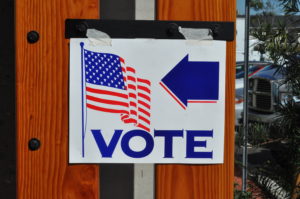 When Governor Jerry Brown signed Assembly Bills 109 and 107 in 2011, more commonly referred to as “prison realignment”, many expected sweeping changes in the way that California dealt with its prison population. The legislation was part of an effort to reform the way that non-violent and non-sex o ffenders are sentenced for their crimes, as well as how they are supervised post-release.1
When Governor Jerry Brown signed Assembly Bills 109 and 107 in 2011, more commonly referred to as “prison realignment”, many expected sweeping changes in the way that California dealt with its prison population. The legislation was part of an effort to reform the way that non-violent and non-sex o ffenders are sentenced for their crimes, as well as how they are supervised post-release.1
There is a new, somewhat unexpected outcome of the prison realignment legislation; thousands of California prisoners are regaining their right to vote. As a result of a legal battle fought on behalf of prisoners by the ACLU and decisions made by Secretary of State Alex Padilla, nearly 60,000 convicts will be eligible to cast a vote in upcoming elections.
These changes could affect the rights you have if you are charged with a crime in California. While many will regain the right to vote, many will not, and you should stay informed about the possible ramifications of a criminal conviction. The experienced criminal defense attorneys at Wallin & Klarich are here to help you understand these changes in California law.
Why Many in California Will Now be Eligible to Vote
A major part of the prison realignment legislation involved changing where low level criminal offenders would serve their time. As part of an effort to reduce the state prison population, prisoners convicted of non-serious and non-violent crimes would now serve their time in county jails.2
As a result, once these prisoners are released they no longer are on state parole (a system of post-release supervision whereby parolees are subject to a number of conditions such as police searches and drug tests).3 Instead, these offenders are released into a program known as county-level supervision.
This is where things get interesting. The Constitution of California mandates the “disqualification of electors while mentally incompetent or imprisoned or on parole for the conviction of a felony.”4
A judge ruled in a lawsuit filed by the ACLU in 2014 that prisoners sentenced under realignment are not in fact on parole and are eligible to vote. By the time the case was appealed, Alex Padilla had begun his term as the new Secretary of State and decided to drop the appeal. As a result, nearly 60,000 former prisoners regained their ability to vote.
How You Could Still Lose Your Vote Rights in California
 The decision issued in 2014 only pertained to those sentenced under realignment who are eligible to serve their time in county jails and participate in county-level supervision. This does not include:
The decision issued in 2014 only pertained to those sentenced under realignment who are eligible to serve their time in county jails and participate in county-level supervision. This does not include:
- Third strike offenders and those paroled from life terms;
- Offenders convicted of a violent or serious offense defined by California Penal Code 667.5(c) and 1192.7(c);
- Those offenders deemed “high risk” by the California Department of Corrections and Rehabilitation;
- Offenders suffering from mental disorders; and
- Those offenders on parole prior to Oct. 1, 20115
If you have been convicted of a crime and meet any of the above standards, you will continue to serve under state parole and will be ineligible to vote. This makes it vital for you to consult with an experienced criminal defense attorney who can help you maintain your ability to vote if you have been charged with a crime.
Speak to an Experienced Criminal Defense Attorney Today
If you have been charged with a crime in California, you should immediately consult with one of our experienced criminal defense attorneys. At Wallin & Klarich, our attorneys have been fighting for over 30 years to help our clients achieve the best possible outcomes in their cases.
With offices in Los Angeles, Sherman Oaks, Torrance, Orange County, San Diego, Riverside, San Bernardino, Ventura, West Covina and Victorville, an experienced Wallin & Klarich attorney can help no matter where you work or live.
Contact offices today at (888) 280-6839 for a free phone consultation. We will be there when you call.
1. [http://www.law.stanford.edu/organizations/programs-and-centers/stanford-criminal-justice-center-scjc/california-realignment]↩
2. [Id]↩
3. [http://www.berkeley.edu/news/media/releases/2009/05/06_crimestats.shtml]↩
4. [http://www.sacbee.com/opinion/editorials/article30334827.html]↩
5. [http://www.cdcr.ca.gov/realignment/Post-Release-Community-Supervision.html]↩



